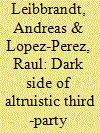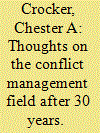|
|
|
Sort Order |
|
|
|
Items / Page
|
|
|
|
|
|
|
| Srl | Item |
| 1 |
ID:
107969


|
|
|
|
|
| Publication |
2011.
|
| Summary/Abstract |
This article experimentally studies punishment from unaffected third parties in ten different games. The authors show that third-party punishment exhibits several features that are arguably undesirable. First, third parties punish strongly a decider if she chooses a socially efficient or a Pareto efficient allocation and becomes the richest party as a result. Interestingly, this form of punishment is especially pronounced in women and more left-wing participants. Second, third parties punish strongly a decider if she chooses an equitable allocation and becomes the richest party as a result. Finally, third parties considerably punish passive parties who make no choice, especially if the latter are richer than the third party. Implications of these findings for social theory are discussed.
|
|
|
|
|
|
|
|
|
|
|
|
|
|
|
|
| 2 |
ID:
107924


|
|
|
|
|
| Publication |
2011.
|
| Summary/Abstract |
While economic sanctions are commonly regarded as nonviolent coercive diplomacy, scholars show that senders-particularly democratic senders-are actually more likely to use military force against the targets of their sanctions. In this article, the authors extend this connection between sanctions and military action by arguing that countries targeted with third-party economic coercion are more likely to be targets of dyadic militarized violence from states not involved in the sanctions. The act of sanctioning, the authors argue, lowers the prohibitions to use violence against the sanctioned state by others. Empirical analysis of dyadic data from 1914 to 2000 shows that, within directed dyads, militarized interstate dispute (MID) initiation is more likely when the potential target of conflict is sanctioned by third-party states, particularly when the sanctioning state is a large democracy.
|
|
|
|
|
|
|
|
|
|
|
|
|
|
|
|
| 3 |
ID:
102492


|
|
|
|
|
| Publication |
2011.
|
| Summary/Abstract |
This article surveys the emergence of conflict management from the academic and policy shadows into a far more prominent field of inquiry and practice. As the barriers to entry into third party roles collapsed at the end of the Cold War, the field of conflict management expanded, diversified, and fragmented into a range of practice areas (scholarly, policy-oriented, and operational). Four phases of this evolution are identified. An increasingly crowded field lacks gatekeepers or natural coherence, underscoring the need for leadership and sustained, coordinated efforts. The study of mediation has blossomed around the work of Zartman and others, while the policy community has swung back and forth in its enthusiasm for third party roles in an age where hard power and smart power vie for pride of place. Conflict management responses are increasingly spontaneous, ad hoc and case-specific. Debate is emerging over the pros and cons of engaging with armed non-state actors that are placed on proscribed lists in the struggle against terrorism. Post-conflict challenges continue to pose a severe test to practitioners of peacebuilding.
|
|
|
|
|
|
|
|
|
|
|
|
|
|
|
|
| 4 |
ID:
178730


|
|
|
|
|
| Summary/Abstract |
Uncertainty about capabilities or resolve is a prominent explanation for war between states. However, we know comparatively little about uncertainty as a cause of armed conflict between domestic actors. This article proposes that irregular leader change in a neighboring country generates uncertainty about third-party resolve and thus increases the likelihood of intrastate armed conflict. I argue that domestic actors take potential third parties’ capabilities and resolve into account when bargaining, that neighboring countries are important potential third parties, and that irregular leader change among these potential third parties results in uncertainty because there is an increased risk of foreign policy change combined with limited access to information. With uncertain estimates of third-party resolve, the risk of bargaining failure and armed conflict increases. Global spatial analyses spanning 1946–2014 corroborate the argument. As expected, I find that irregular leader change in one or more neighboring countries increases the probability of intrastate armed conflict onset. The results are robust across three different distance thresholds for neighboring countries, using time and country fixed effects and several alternative model specifications. Overall, this article advances our knowledge about uncertainty as a cause of civil war and sheds new light on the adverse consequences of irregular leader change.
|
|
|
|
|
|
|
|
|
|
|
|
|
|
|
|
|
|
|
|
|